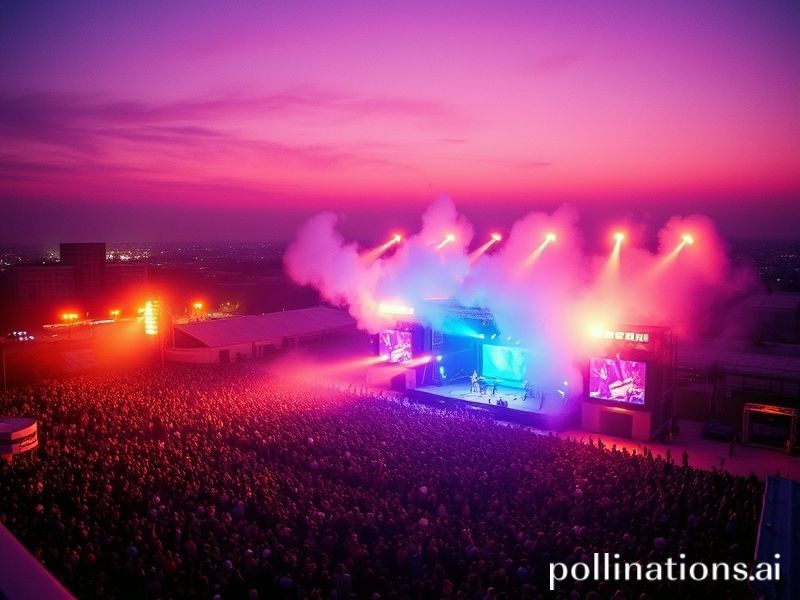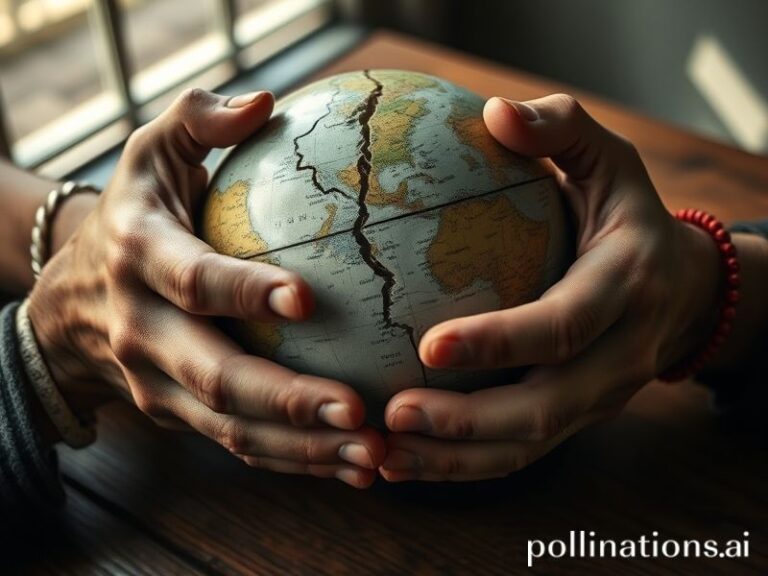Primavera Sound 2026: How a Barcelona Pop Fest Became the World’s Loudest Geopolitical Trade Expo
Primavera Sound 2026: The World’s Loudest Peace Summit
By Eduardo Valdez, International Correspondent at Large
Barcelona, 6 June 2026 – The Parc del Fòrum smells of sunscreen, irony, and whatever TikTok has declared the “new patchouli” this season. Tens of thousands have converged on the Mediterranean shoreline for Primavera Sound, the annual pop-music panacea now so sprawling that Google Maps has added a dedicated layer titled “Avoid if Sober.” From an international vantage—say, a half-collapsed press tent sponsored by a crypto-exchange that no longer exists—the festival looks less like a concert series and more like a trade expo for the post-national mood.
Consider the geopolitical optics: the main stage is flanked by two giant LED screens alternately broadcasting climate-crisis PSAs and an NFT auction of the artist currently onstage. This year’s lineup—Billie Eilish, Bad Bunny, a holographic reunion of The Smiths (Morrissey’s avatar politely muted for hate-speech compliance), and a surprise set by a K-pop/afrobeats supergroup called BTS×Burna—reads like a UN Security Council rotation curated by Spotify’s algorithm. Diplomats from 47 countries have official wristbands; the Saudi pavilion is giving away camel-milk cold brew, while the Nordic nations have pooled resources to offer free therapy under a tasteful pine-scented dome. Somewhere, Henry Kissinger’s ghost updates its LinkedIn.
Tickets sold out in 11 minutes despite costing roughly the GDP of Tuvalu. How? The festival floated a “carbon-offset subscription” that promises to plant one tree for every bass drop. Critics note the saplings are in a disputed zone of the Amazon currently leased to a fast-food chain, but the QR code is fetching on Instagram. Meanwhile, inflation-ravaged Argentinians have flown 18 hours on budget airlines to sell their plasma for merch, proving once again that human plasma is the only truly universal currency.
Security is handled by a private-public consortium whose uniforms look suspiciously like those abandoned by the Afghan National Army, only now embroidered with the Pepsi logo. Facial-recognition gates greet attendees in eight languages, then apologize in twelve for misidentifying them. Overheard in line: “I came for rock ’n’ roll, but I stayed for the soft-power diplomacy.” Between sets, panels discuss “Music as Sanctions Workaround,” moderated by a former ECB economist who moonlights as a techno DJ. His thesis: nothing undermines embargoes like a collab track dropped at 3 a.m. GMT+2.
The festival’s app, powered by an AI that learned human behavior from doom-scrolling, nudges users toward “micro-experiences” based on their serotonin levels. If your wristband detects rising cortisol, it reroutes you to the “Silent Anger Disco,” where everyone dances with noise-canceling headphones to a playlist titled “Global Supply Chain Disruptions in D-minor.” The Japanese delegation reportedly filed a formal complaint when the algorithm served them vaporwave remixes of Fukushima decontamination jingles. The Italians, ever practical, simply hacked the feed to blast vintage Mina and called it cultural exchange.
Food options are a miniature WTO summit. Ghanaian jollof competes with Catalan fusion kimchi-tacos under a sign that reads “Colonize Your Tastebuds.” Prices are listed in euros, pounds, dollars, and a new festival token called “VibeCoin,” whose volatility rivals the lira in the ’90s. Still, the lines are longest at the Venezuelan arepa stand—rumor has it the chef accepts bolívars, pity, or firstborn children.
What does it all mean? From the vantage of the press pen—where the Wi-Fi password is “LateStageCapitalism123”—Primavera 2026 is the clearest signal yet that pop culture has become the last functioning multilateral institution. When nation-states can’t agree on carbon ceilings, they can at least synchronize pyrotechnics. When trade wars throttle supply chains, the supply of bass remains gloriously tariff-free. And when diplomacy fails, there’s always the shared human ritual of screaming the chorus to “Creep” with 70,000 strangers who owe student loans in three different currencies.
As dawn breaks over the Forum, a final irony: the loudest cheers aren’t for the headliners but for the city’s new robotic street sweepers, programmed to recycle cigarette butts into limited-edition vinyl. The crowd surges forward, phones aloft, desperate to document their own participation in the circular economy. Somewhere behind the barricades, a tired volunteer from New Zealand shrugs: “We came to save the world with music. Turns out the world just wanted merch.”
And that, dear readers, is globalization in perfect 4/4 time.







